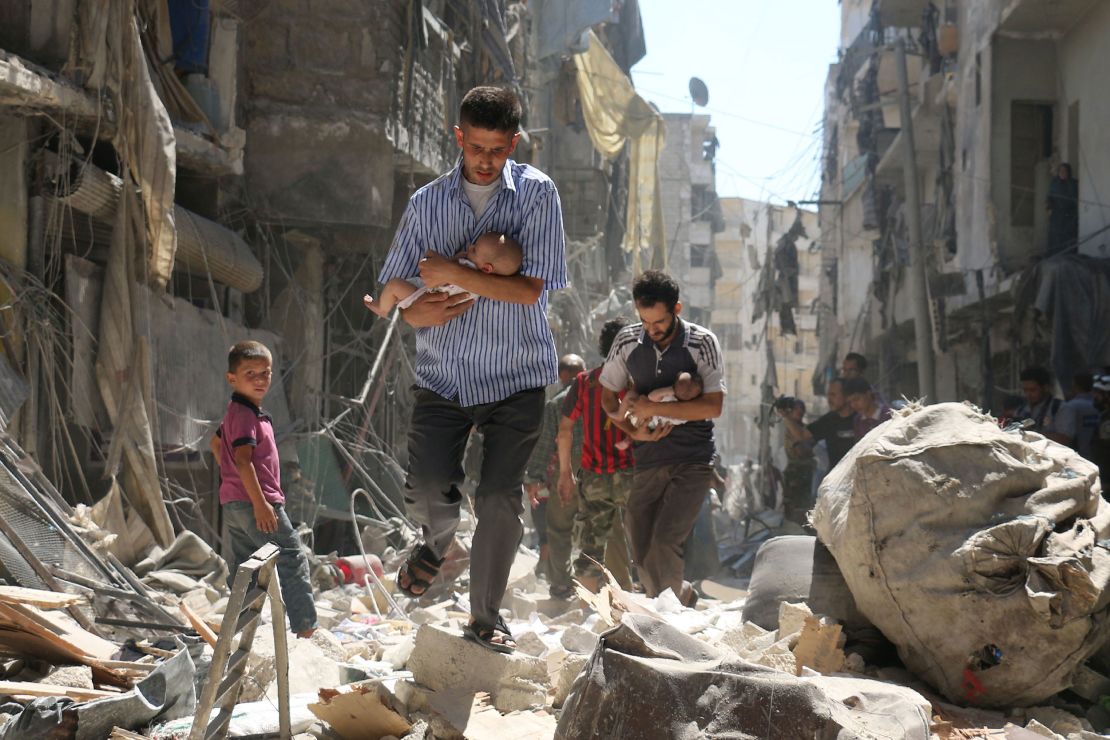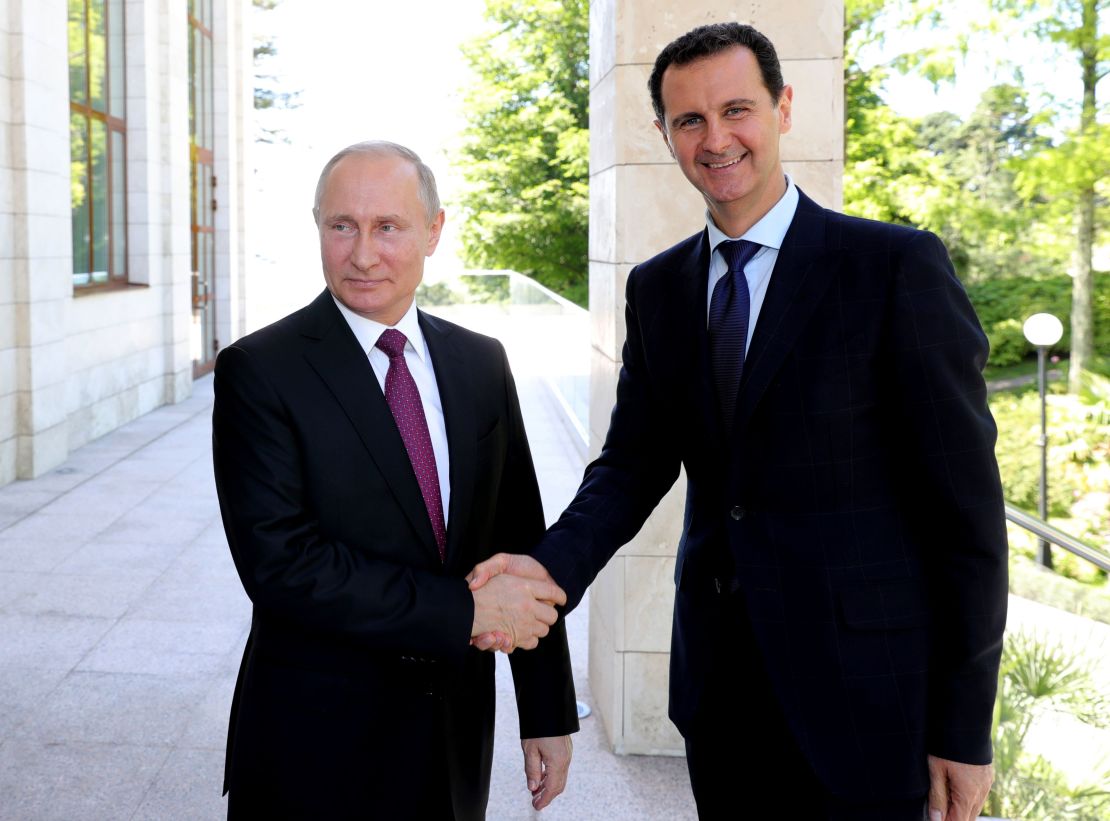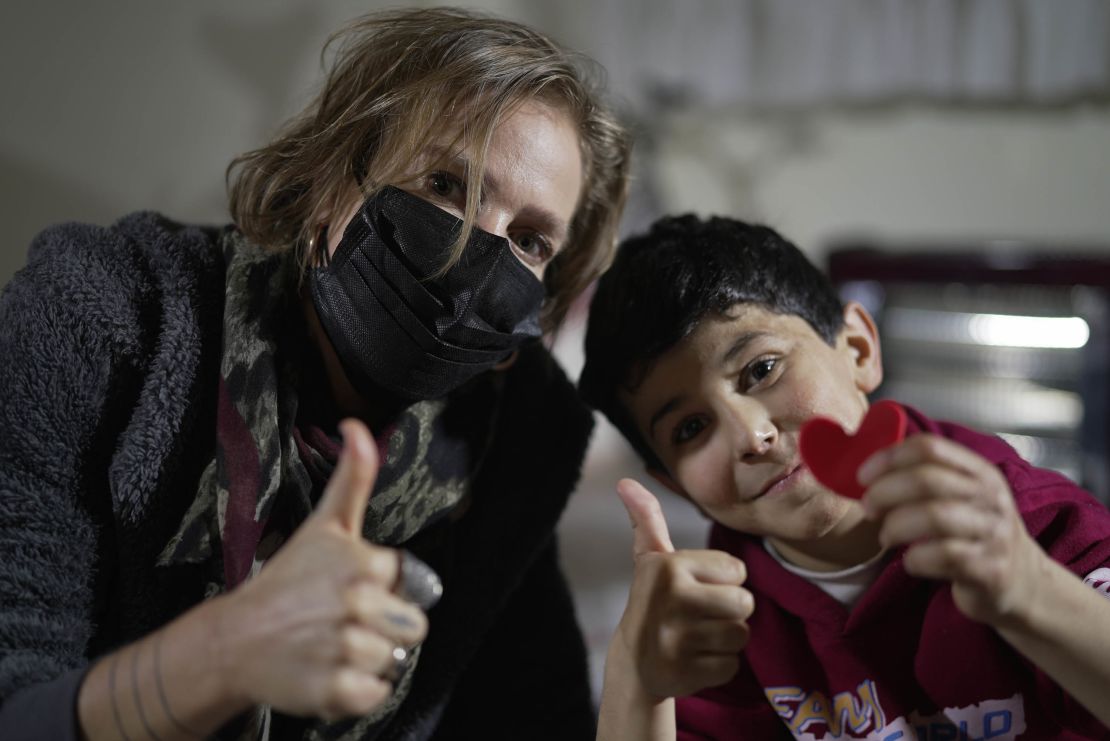Long gone is the illusion that any reporting out of Syria will change the realities on the ground. That was painfully eliminated early on.
It ripped many of us journalists to shreds, left us flailing, wondering what more we could have done, or what we should have done better. It gutted us to hear from contacts and activists, who became friends over the years, repeatedly ask: “why doesn’t anyone care?”
Eventually, they went silent, many of them either killed or disappeared.
In Idlib, I stare down at a fresh mural that commemorates 10 years of war, its colors almost too bright, too bold against the gray tones of the rebel-held city. It depicts the passage of the Syrian war, beginning with an image of demonstrators calling for the downfall of the Bashar al-Assad regime. The same artist painted a mural of George Floyd in the ruins of a bombed out building, out of solidarity with the notion that they, Syrians, know what it is like not to breathe.
To not breathe because of chemical weapons. To be suffocated by the thick dust and debris of bombs, and crushed under the weight of a totalitarian system.

When I close my eyes, I can still hear the excitement in protesters’ voices during the early days of the uprising a decade ago. How full of hope they were, how utterly convinced that, if they just hung in there long enough, there would be change. Surely, they thought, if world powers saw their suffering, something would be done.
How quickly it all turned violent. The Assad regime gunned down those who called for a peaceful transition to democracy. Gulf countries sent in suitcases of cash with a wink and a nod towards more religiously conservative fighting units. Assad let former al Qaeda members and other criminals out of jail. The US, at the peak of its involvement, half-heartedly trained some “moderate” rebels, many of whom went on to join the ranks of extremist groups.
President Barack Obama promised to militarily intervene if Assad used chemical weapons in his brutal military campaign – when the regime gassed civilians in 2012, the first in a series of chemical attacks that killed nearly 1,500 people, Obama’s infamous “red line” was ignored and forgotten. ISIS emerged out of Iraq, and spread to Syria. Russia entered Syrian airspace and bombed rebel held areas to the ground. Turkey entered the fray, taking over parts of northeast Syria and stopping the advance of Russia and Damascus.

Yet despite the cacophony of international meddling, Syrian civilians did have a voice. But their suffering did not matter. It did not matter how many videos came out of the most documented war of our time. It did not matter how many dead bodies were pulled out from under the rubble. It did not matter how many risked their lives in order to unearth the truth, how many disappeared into regime prisons and the jails of opposition factions. There were bigger geopolitical power plays at hand, ones that negated the lives of the innocent. Syria taught us that.
There were moments where I wished I could transport the decision-makers to Syria so they could bear witness to the extreme suffering and injustice. We tried to depict it, report it as best we could, as raw as we could, but it seemed not to phase them. Maybe living it for a brief moment would.
I wished for them to look into the eyes of a boy like 10-year-old Sultan and see for themselves how they fluctuate from sparkling, like child’s eyes should, to darkening as the past creeps into his memories.
When Sultan Bizmawi was 5 years old, his baby brother was killed in a bombing. When he was 6, his father went to the market and was killed in a rocket attack. When he was 8, an airstrike hit fuel canisters near him, burning his skin.

Bizmawi looks at old photographs of himself. “Look, I was so cute,” he says. His mother hates hearing him say that, it kills her. Tears pour down her face as she thinks back on all she has lost. She wishes she could just give up, but she carries on, for the sake of her little boy.
“I’ve seen so many children die in front of me, and I couldn’t save a single one,” says Amar Shaaban. “I couldn’t even save my son.”
I wish world leaders could meet 13-year-old Renad. When she was 3, her father was blindfolded and detained at a checkpoint in front of her. She was tossed into a forest and found screaming by strangers who brought her to her grandparents, who took her into their care. A few years later, she lost her leg as was playing hide-and-seek by her front door. Her family hadn’t known that mines were daisy chained along the walls of their home.
Her grandfather and her child protection officer worry about her psychological state. Her face is expressionless. It’s as if she’s buried her pain, along with the rest of her feelings, in a deep, inaccessible place.
She mostly answers in single words or brief sentences.
“Do you imagine a world without war?”
“No.”
“Why not?”
She’s silent.
“Can you imagine a world without war?”
“No.”
I wish decision-makers could for one minute experience the fear of seeing fighter jets overhead. A bombing sucks the air out of your body. To watch people flee, barefoot children freeze, the trauma engulfing their faces, suffocates you with emotion.
On the weekend before the decade anniversary of Syria’s uprising, we drive past the mud strewn refugee camps that have mushroomed all over the countryside of rebel-held Idlib, growing with each bombing, each regime and Russian assault. We stare at the children who have known nothing but war for a decade now.
In photos: Syria's civil war
When we stop to film people don’t ask “why is this happening to us?” People don’t ask “why doesn’t anyone care?” Those questions stopped a long time ago.
We stand by a pile of rubble in front of a building whose façade is utterly blown out, watching a child in a bright t-shirt play in the dust. We wonder about all the stories we will never hear, stories that disappeared the moment these lives were pulverized.
Reporting out of Syria has transcended a desire to bring about big change. It’s about listening and witnessing. It’s about the viewers and readers we may never meet but are stirred to action by Syria’s story. It’s about people like the young man who stopped me on a flight to Lesbos, Greece to say that he decided to volunteer at a refugee camp because he had seen one of our reports.
We go to Syria for the moments that often happen off-camera, for the mother who asks us in for a cup of tea because she just wants someone to talk to, someone to listen to her. We go for the stories we hear of extreme bravery and kindness that fill us with admiration and pain.
We go back because we will not give in to apathy or indifference and allow that to demoralize us into silence. When the dust settles, there will be a record, one that cannot be altered by the “victors” – if there can even be such a thing in a war like this one.
We go back because we have to. We can’t live with ourselves if we don’t.
CNN’s Gul Tuysuz and Brice Laine contributed to this report from Idlib, Syria. CNN’s Eyad Kourdi contributed from Hatay, Turkey.






























































